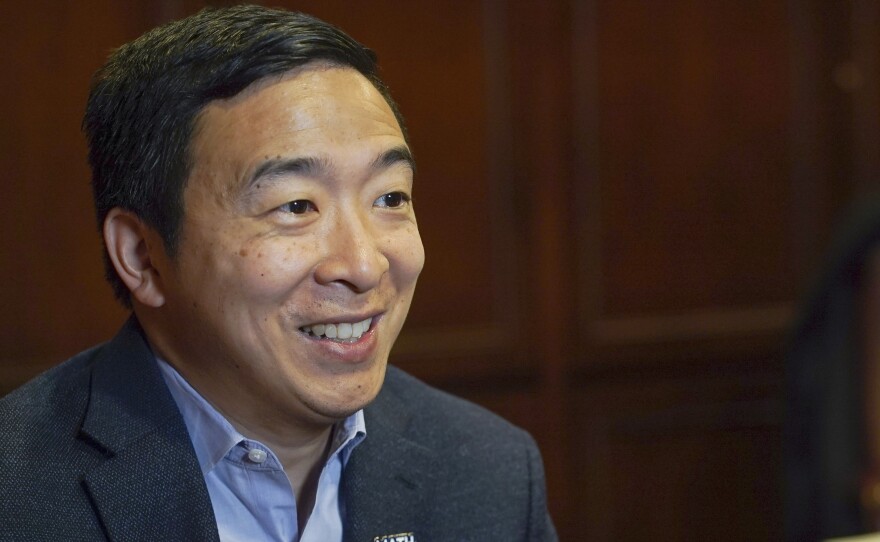Businessman Andrew Yang has qualified for the sixth Democratic primary debate next week.
The upstart entrepreneur and nonprofit executive becomes the seventh — and likely final — candidate to make the Dec. 19 debate cut. He reached the polling threshold after a Quinnipiac University poll was released Tuesday.
Yang will join former Vice President Joe Biden, South Bend, Ind., Mayor Pete Buttigieg, Minnesota Sen. Amy Klobuchar, Vermont Sen. Bernie Sanders, billionaire businessman Tom Steyer and Massachusetts Sen. Elizabeth Warren in the PBS NewsHour/Politico debate at Loyola Marymount University in Los Angeles.
The Asian American candidate also brings some needed diversity to the debate stage amid criticism that the event could feature only white candidates after California Sen. Kamala Harris, who had already qualified, dropped out last week.
As of now, the seven-candidate field will be the smallest debate yet for Democrats, coming just weeks before the Iowa caucuses and New Hampshire primary will kick off voting. There are still 15 total candidates in the race.
Candidates have until Thursday at midnight to meet the Democratic National Committee's debate requirements, which stipulate that a candidate must hit 4% in four early-state or national polls or 6% in two early-state polls from Oct. 16 through Dec. 12, along with having 200,000 unique donors, with 800 of those from 20 different states.
Those benchmarks exclude New Jersey Sen. Cory Booker, who made the November debate, along with former Housing and Urban Development Secretary Julián Castro, who hasn't debated since October. Their absence leaves the stage without an African American or Hispanic candidate — both demographics important to the makeup of the Democratic Party. Neither has registered a qualifying poll so far, and with only two days left to do so the likelihood of making the cut is slim.
Hawaii Rep. Tulsi Gabbard, who has staked out a more conservative and controversial position within the primary, needs only one more poll to qualify, but she announced Monday night on Twitter she wouldn't attend even if she met the requirements.
Yang's qualification continues a strong primary push during his first-ever run for public office. Yang has campaigned as a nerd who loves math and has warned about the dangers of automation to the economy. To counter those changes, he has proposed a $1,000 per month universal basic income "Freedom Dividend" to help struggling families.
Copyright 2019 NPR. To see more, visit https://www.npr.org.






